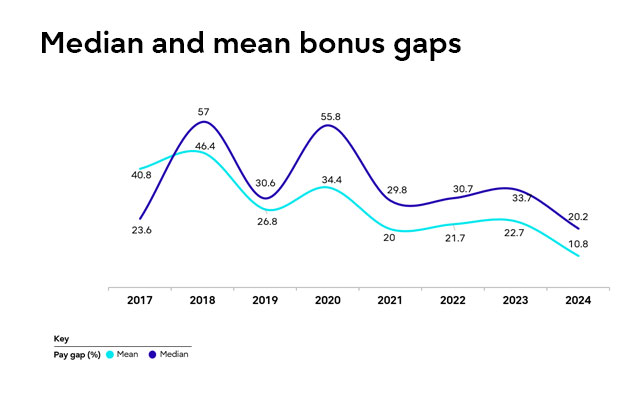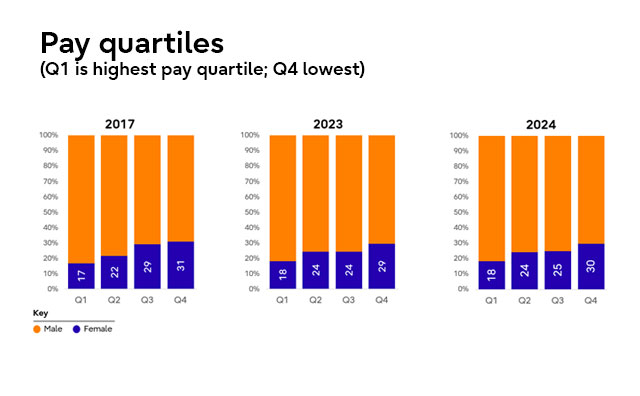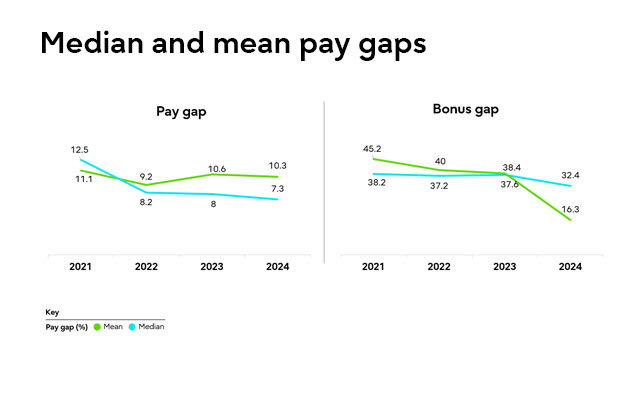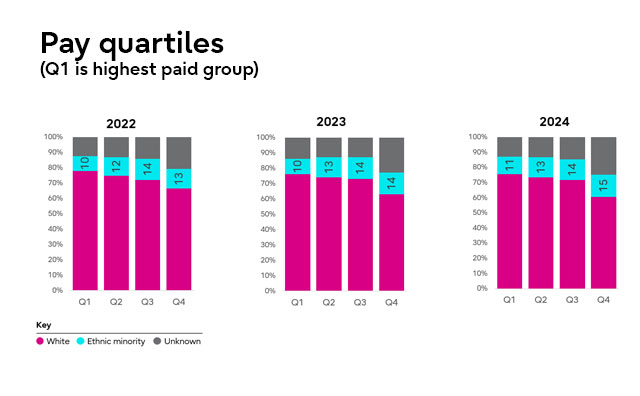Diversity Pay Gaps

At Fujitsu, we’re dedicated to equity and meaningful representation for all identities at every level of our organisation. A key part of this commitment is understanding our diversity pay gaps, which helps us develop actionable plans that drive measurable change and create an environment where everyone can thrive and be completely themselves.
This may be the first time you are coming across diversity pay gaps, so it is useful to understand what this means and why it is important. A diversity pay gap can look at the difference in average pay relating to gender, ethnicity, disability or LGBTQI+, irrespective of their role or seniority. At Fujitsu, our diversity pay gaps currently look at the difference in average pay between men and women, or people from different ethnic backgrounds, irrespective of their role or seniority.
The UK context
Gender
Since mandatory gender pay gap reporting started seven years ago (2017/18), recent analysis by the Office for National Statistics shows that the gender pay gap is decreasing, down to 7% across all industries, however according to Pinsent Masons, in the Technology, Media and Telecoms industry the pay gap, although reducing (currently it is 15.6%) the rate of decrease is slowing down.
Ethnicity
The UK is increasingly becoming more ethnically diverse, with data from the 2023 government response to consultation on Ethnicity Pay Reporting 2023 showing an ethnic minority employment rate of 69.4%. There is currently no mandatory legal requirement to report on the ethnicity pay gap, like there is for gender. However, since 2021 Fujitsu has voluntarily published this information to ensure that we are accountable and have a plan to achieve a 0% pay gap.
Progress in our pay gaps
In 2017, Fujitsu was in the first 1% of UK organisations to publish our UK gender pay gap. This year has seen an increase in our pay gap of 0.2% from 9.9% to 10.1%. Although we are disappointed by this increase, we continue to be either on parr or in most cases better than other organisations in the tech sector and we are proud of the fact that since first reporting in 2017 we have seen a 44% reduction in our median pay gap.
Fujitsu voluntarily published our UK ethnicity pay gap for the first time in 2021. This year, we have seen a positive decrease of 0.7% to 7.3%. McKinsey research has emphasised the link between diverse, inclusive environments and business success, with studies showing that ethnically diverse organisations are better positioned to attract top talent and drive positive outcomes. Publishing our ethnicity pay gap data voluntarily each year has helped us stay accountable and provided us with critical insights to guide our strategies.
What is happening at Fujitsu?
At Fujitsu, we publish both ethnicity and gender as a ‘Diversity Pay Gap Update’, because we want to be transparent about where we need to improve representation of women and people of all ethnicities within Fujitsu, along with the actions we are taking to achieve this.
In December 2024, we shared with our UK colleagues the following progress we have made towards a 0% pay gap for gender and ethnicity, particularly as we have a lower diversity pay gaps in these areas than what has been seen across the UK and our industry.
Since starting to report gender pay gaps in 2017/2018 we have seen a decrease in the mean pay gaps of 41%, from 16.7% to 9.8% in 2024 (down 0.9 ppts since 2023) and 44% decrease in the median pay gap from 17.9% to 10.1% in 2024 (up 0.2 ppts since 2023
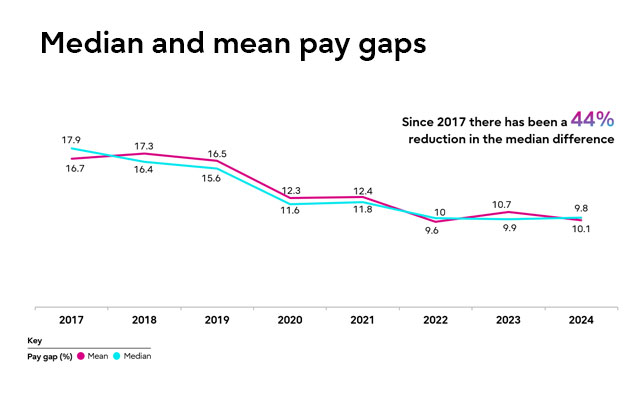
In 2021 we voluntarily published our ethnicity pay gap with a 12.5% median and 11.1% mean. This year, we are reporting that our ethnicity pay gap has decreased by 0.7ppts to 7.3% median and 10.3% mean (down 0.3ppts) which is an overall decrease of 42% in the median pay gap and 7% in the mean.
Our plans to achieve Pay Equity
We remain focused on our goal of achieving a 0% pay gap across both gender and ethnicity. To help make this happen, we’re doubling down on three areas:- Diverse Recruitment at Senior Levels: One factor affecting our progress is the composition of senior roles in our organisation. Simply put, we need to appoint more women and more ethnically diverse people into leadership positions. Research by the Chartered Institute of Personnel and Development (CIPD) has shown that organizations with diverse leadership both achieve better business performance and are more likely to report positive pay gap improvements. As more diverse individuals take on senior roles, we expect to see a natural reduction in the pay gaps over time. Discover more
- Manager Awareness in Pay Reviews: We’ll continue encouraging people managers and business line leaders to consider how pay decisions impact our overall pay gap. Educating and empowering managers on this front ensures that we’re making equitable decisions at every level.
- Encouraging Diversity Data Disclosure: External insights, such as those from CIPD, show that full data transparency is essential to identifying and closing gaps. Currently, 85% of our UK workforce has shared with us their ethnicity information and fewer colleagues have shared other diversity information, such as whether or not they have a disability. The more accurate an understanding we have of our workforce diversity, the more reliably we can calculate our pay gaps information and set our action plans to eradicate these. We’re therefore encouraging all employees to disclose their diversity information, which will give us the complete picture we need to achieve our equity goals.
Fujitsu UK are passionate about delivering excellent service to our customers every day. Not only this, but our people live and breathe our global purpose to make the world more sustainable by building trust in society through innovation - that's about seeing the value technology can create for customers today and in the future - and making it real.
We intentionally create the right culture culture to enable and encourage innovation by ensuring that all of our people feel safe and supported at work, along with feeling included and that they belong, a core feature of our Be Completely You culture.

